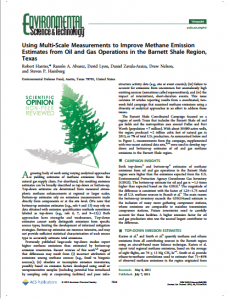Full Title: Using Multi-Scale Measurements to Improve Methane Emission Estimates from Oil and Gas Operations in the Barnett Shale Region, Texas Author(s): Robert Harriss, Ramón A. Alvarez, David Lyon, Daniel Zavala-Araiza, Drew Nelson, and Steven P. Hamburg Publisher(s): Environmental Science and Technology and the Environmental Defense Fund
Author(s): Robert Harriss, Ramón A. Alvarez, David Lyon, Daniel Zavala-Araiza, Drew Nelson, and Steven P. Hamburg Publisher(s): Environmental Science and Technology and the Environmental Defense Fund
Publisher(s): Environmental Science and Technology and the Environmental Defense Fund
Publication Date: July 1, 2015
Full Text: Download Resource
Description (excerpt):
Agrowing body of work using varying analytical approaches is yielding estimates of methane emissions from the natural gas supply chain. For shorthand, the resulting emission estimates can be broadly described as top-down or bottom-up. Top-down estimates are determined from measured atmospheric methane enhancements at regional or larger scales. Bottom-up estimates rely on emissions measurements made directly from components or at the site level. (We note that bottom-up emission estimates (e.g., refs 4 and 13) may rely on data obtained with emission quantification methods sometimes labeled as top-down (e.g., refs 6, 7, and 9−12).) Both approaches have strengths and weaknesses. Top-down estimates cannot easily distinguish emissions from specific source types, limiting the development of informed mitigation strategies. Bottom-up estimates are resource intensive, and may not provide sufficient statistical characterization of each source type to accurately estimate total emissions.
